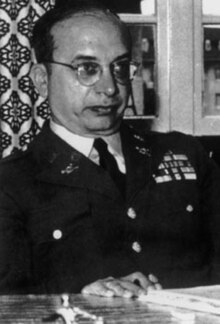Philip J. Corso
| Philip James Corso | |
|---|---|
 |
|
| Born | May 22, 1915 |
| Died | July 16, 1998 (aged 83) Jupiter, Florida |
| Allegiance | United States of America |
| Service/branch | United States Army |
| Years of service | February 23, 1942 – March 1, 1963 |
| Rank | Lieutenant Colonel |
| Commands held |
Battalion Commander of European Air Defense Intel Staff Officer Plans & Estimate Branch GHQ Far East Command Chief Special Project Branch G-2 Section of the HQ AFFE 8000th AU Command Chief Foreign Technology Division of the United States Department of Defense Staff Officer in the Plans Division OCRD Washington DC, Fort Riley |
| Battles/wars |
World War II Korean War |
| Awards |
American Campaign Medal American Defense Service Medal Bronze Star Commendation Ribbon EAME Campaign Medal Legion of Merit World War II Victory Medal |
Philip James Corso (May 22, 1915 – July 16, 1998) was an American Army officer.
He served in the United States Army from February 23, 1942, to March 1, 1963, and earned the rank of lieutenant colonel.
Corso published The Day After Roswell, about how he was involved in the research of extraterrestrial technology recovered from the 1947 Roswell UFO Incident. On July 23, 1997, he was a guest on the popular late night radio show, Coast to Coast AM with Art Bell where he spoke live about his Roswell story. This interview was rebroadcast by Coast to Coast AM on July 3, 2010.
After joining the Army in 1942, Corso served in Army Intelligence in Europe, becoming chief of the US Counter Intelligence Corps in Rome. In 1945, Corso arranged for the safe passage of 10,000 Jewish World War II refugees out of Rome to the British Mandate of Palestine. He was the personal emissary to Giovanni Battista Montini at the Vatican, later Pope Paul VI, during the period when the "Nazi Rat Lines" were most active.
During the Korean War (1950–1953), Corso performed intelligence duties under General Douglas MacArthur as Chief of the Special Projects branch of the Intelligence Division, Far East Command. One of his primary duties was to keep track of enemy prisoner of war (POW) camps in North Korea. Corso was in charge of investigating the estimated number of U.S. and other United Nations POWs held at each camp and their treatment. At later hearings of the Senate Select Committee on POW/MIA Affairs, Corso provided first hand testimony, that many hundreds of American POW's were abandoned at these camps.
...
Wikipedia
